|
|
|
Sort Order |
|
|
|
Items / Page
|
|
|
|
|
|
|
| Srl | Item |
| 1 |
ID:
129132


|
|
|
|
|
| Publication |
2014.
|
| Summary/Abstract |
The Defense Department's chief weapons tester called in January for the redesign of a key component of the U.S. system intended to intercept long-range missiles launched from North Korea or Iran, raising questions about the department's plans to expand the current system. J. Michael Gilmore, the Pentagon's director of operational test and evaluation, wrote in his annual report, released Jan. 29, that recent test failures of the U.S. ground-based interceptor (GBI) system raise concerns about the system's reliability and suggested that the missile's exoatmospheric kill vehicle (EKV) be redesigned to assure it is "robust against failure." Echoing Gilmore's view, Frank Kendall, undersecretary of defense for acquisition, technology and logistics, told a Feb. 25 conference in Washington, "We've got to get to more reliable [missile defense] systems." Merely "patching the things we've got is probably not going to be adequate. So we're going to have to go beyond that," he said. The EKV plays a central role in the missile defense mission. It is lifted into space by a booster rocket and then uses its onboard sensors to locate an incoming enemy warhead and destroy it on impact. U.S. officials have compared the task to hitting a bullet with another bullet.
|
|
|
|
|
|
|
|
|
|
|
|
|
|
|
|
| 2 |
ID:
132029
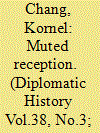

|
|
|
|
|
| Publication |
2014.
|
| Summary/Abstract |
During the Second World War, the United States developed a propaganda apparatus to counter fascist propaganda in Mexico, and later, in Latin America more broadly. Mobilizing the resources and expertise of Hollywood, multinational corporations, and the social sciences, the United States attempted to gauge and sway Mexican popular opinion. This concerted effort at mass persuasion marked the first time that the United States attempted to systematically shape inter-American relations by influencing popular public opinion directly. But this project to inculcate the Mexican masses with U.S. propaganda was marred by difficulties and mishaps that hindered and distorted its transmission. On the other side, Mexicans contested, negotiated, and resisted these overtures, indicating that the influence of U.S. propaganda was neither irresistible nor straightforward. This is a story, then, about U.S. wartime propaganda, how it was developed on the ground and its muted reception in Mexico.
|
|
|
|
|
|
|
|
|
|
|
|
|
|
|
|
| 3 |
ID:
129106
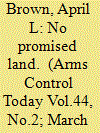

|
|
|
|
|
| Publication |
2014.
|
| Summary/Abstract |
This year marks the 60th anniversary of the Castle Bravo nuclear detonation in the Marshall Islands. The U.S. military conducted 67 nuclear tests in the Pacific Proving Grounds from 1946 to 1958. The Castle Bravo test, conducted on March 1, 1954, at Bikini Atoll, was 1,000 times the force of the Hiroshima bomb. The explosion sent irradiated coral dust throughout the atolls. Neighboring atoll populations, who were neither informed of the tests nor relocated prior to the detonation, today continue to experience health issues, cultural upheaval, and physical dislocation due to the environmental degradation produced by the test and the effects of climate change. The Bravo detonation remains the largest nuclear test ever conducted by the United States.[1] Although the United States tested an additional 55 nuclear weapons in the Marshall Islands, Castle Bravo is the most notorious due to its impact, primarily on the people of the Marshall Islands.
|
|
|
|
|
|
|
|
|
|
|
|
|
|
|
|
| 4 |
ID:
130957


|
|
|
|
|
| Publication |
2014.
|
| Summary/Abstract |
America's Employment of Weaponized Unmanned Aerial Vehicles (Uavs), Popularly Known as "drones," to kill alleged terrorists in Pakistan's federally administered tribal areas (FATA) fuels sustained controversy in Pakistan. Pakistani outrage has steadily deepened since 2008, when the United States increased the frequency of the strikes.1 The increasing use of "signature strikes" has been particularly controversial in (and beyond) Pakistan, because such strikes are targeted at "men believed to be militants associated with terrorist groups, but whose identities aren't always known."2 Whereas personality strikes require the operator to develop a high level of certainty about the target's identity and location, based on multiple sources such as "imagery, cell phone intercepts and informants on the ground,"3 operators may "initiate a signature strike after observing certain patterns of behavior."4 When conducting signature strikes, the United States assesses that the individuals in question exhibit behaviors that match a pre-identified "signature" (for example, pattern of observable activities and/or personal networks) that suggests that they are associated with al Qaeda and/or the Pakistani or Afghan Taliban organizations.5 Because the identity of the target is unknown, even during the strike, it is possible that these persons are innocent civilians, a possibility that both current and former U.S. government officials concede.6 While the George W. Bush administration employed both personality strikes from 2004 and signature strikes from 2008 in Pakistan, the administration of Barack Obama has redoubled the use of both types.7 This has ignited public protests against the drones in Pakistan, particularly in Pakistan's urban areas-far removed from the tribal areas where drones are employed. It has also galvanized a vigorous debate within Pakistan's National Assembly, which tried, but ultimately failed, to curtail the strikes
|
|
|
|
|
|
|
|
|
|
|
|
|
|
|
|
| 5 |
ID:
130951
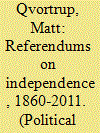

|
|
|
|
|
| Publication |
2014.
|
| Summary/Abstract |
There have been more than 50 independence referendums since the middle of the 19th Century when Texas, Virginia and Tennessee-albeit unsuccessfully-voted to leave the USA. A handful of plebiscites were held in each decade after 1945, but most independence referendums were held after the break-down of communism. Most have resulted in majorities for independence. However, such plebiscites have been rare in countries with established systems of democratic government and the results may not be a fair reflection of the views of the voters. When referendums have been held in democratic countries, they have often resulted in a no-vote (though Montenegro is an exception to the rule). Referendums have on a few occasions resulted in the exacerbation of ethnic conflict, such as in Bosnia-Herzegovina and in East Timor. But generally speaking referendums are not correlated with civil war; indeed, war resulted in only 13 percent of the cases.
|
|
|
|
|
|
|
|
|
|
|
|
|
|
|
|
| 6 |
ID:
130869
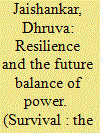

|
|
|
|
|
| Publication |
2014.
|
| Summary/Abstract |
There is more to power than the traditional indicators of resources, influence and perception. Not long ago - in the 1980s, in fact - the US policy community was in the throes of a high-stakes debate about the nature and extent of Soviet power. On one side was a large group who believed that the United States was losing ground to an increasingly powerful and aggressive Soviet Union. Proponents of this view pointed to the shifting balance of conventional military power in favour of Moscow, particularly in Europe, and to Soviet aggression in places such as Afghanistan. As a consequence, many American policymakers advocated increases in military spending to balance against the Soviet Union, a position that was also supported by many in the US military establishment. Others who shared this perspective proposed a more conciliatory and accommodating approach towards their rival, one that was helped along by Soviet leader Mikhail Gorbachev's move towards glasnost, and which was eventually manifested in arms-control talks between Washington and Moscow.
|
|
|
|
|
|
|
|
|
|
|
|
|
|
|
|
| 7 |
ID:
130179
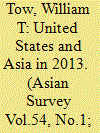

|
|
|
|
|
| Publication |
2014.
|
| Summary/Abstract |
Prospects for a U.S. decline in global power generated by political strife and protracted economic recession at home have affected Washington's regional diplomatic presence and strategic influence in the Asia-Pacific. Ongoing regional power politics and economic imperatives may constrain the ability of the U.S. to quickly recover from the largely self-imposed damage it has inflicted on its future role as a central regional player.
|
|
|
|
|
|
|
|
|
|
|
|
|
|
|
|
| 8 |
ID:
132118
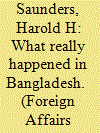

|
|
|
|
|
| Publication |
2014.
|
| Summary/Abstract |
On November 13, 1970, a devastating cyclone struck East Pakistan, a province dominated by the Bengali ethnic group and physically separated from the rest of Pakistan by India. The cyclone killed an estimated 230,000 people, and in its wake, the national government, based in West Pakistan, did too little to alleviate the suffering, further alienating the long-underrepresented Bengalis. A year later, they would declare independence. As an officer in the U.S. consulate in the East Pakistani capital of Dhaka later noted, "The cyclone was the real reason for the final break."
|
|
|
|
|
|
|
|
|
|
|
|
|
|
|
|
|
|
|
|
|